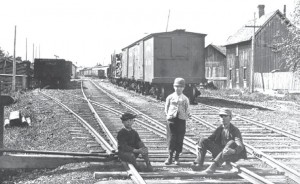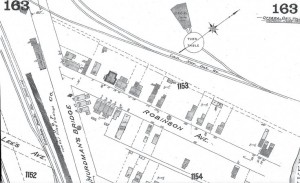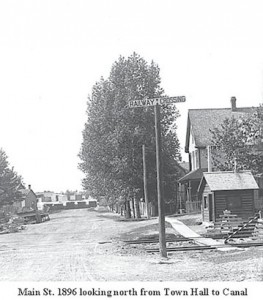Marjorie Carver
During the ‘Dirty 30s’ the depression was in full bloom, and people were hurting. So many people were losing their jobs, and there was no work to be found.
I remember my dear Mother saying: “We are so lucky, your Father has three days work a week at the railway.” On the other days, Dad would do any odd job he could get to augment those wages. He would come home on paydays with the little brown envelope in his hand and walk through the house to the kitchen where Mom would be waiting. They had a little ritual. Mom would put her handout and Dad, with great flourish, would snap each bill before handing one bill after another into Mom’s palm. A little bit went back into Dad’s hand, just for himself.

In this 1901 photo, three young boys pose on the railway tracks near the current area around Mann Avenue and the Queensway. Photo from History Of Old Ottawa East Archives
We lived on Havelock Avenue, at the end of a dead-end street. Across the road was the big ‘gully’, and just beyond the gully were the railway tracks and the ‘big Y’. Down the track, to the left, was the CNR complex which included the huge roundhouse with its turntable, a big grey wooden building housing an office and supplies. The machine shops were further down the tracks. They’re all gone now, replaced by the Queensway.
In the summertime, we would sit on our big front verandahs. During the Depression, we could see the ‘Hobos’, who had hitched a ride on the freight and coal cars – all coming east to find employment. One time, we counted 100 men on those cars. So sad. Only the clothes on their backs and no food.

A 1912 railway map shows the roundhouse that Marjorie Carver remembers vividly in her reflections on an Old Ottawa East childhood. Image from History Of Old Ottawa East Archives
Some of the Hobos would hop off the trains and make their way over to our street. I know for sure that they had our house ‘marked’. Mom never turned them away. She always had a special greeting: “What can I do for you, young man?” If they were hungry, I would have the task of taking them down the side lane and around to our old English garden. Mom would put out a pan of warm water, some soap and a towel for the person to clean up. The next thing to arrive would be a large pot of hot tea, with a teacup. Most of the time, Mom would be able to make the gentlemen huge sandwiches. I don’t know how she ever did it because there was never a lot of food in our old icebox.

Main St. 1896 looking north from (Old) Town Hall to Canal. Photo from History Of Old Ottawa East Archives
When I was about six-years-old, and playing outside at the front of our house, I noticed two Hobos coming down our street. One took a small piece of paper out of his pocket to check something. They talked quietly together. Seeing our house number, they walked up onto the verandah and knocked on the door. Mom came to the door, and with the usual: “What can I do for you, gentlemen? Are you hungry?” “No, ma’am. We just ate. But we would like to borrow some needle and thread to mend our clothes and to sew some buttons on our shirts.” Once again, I took them around to the garden.
I shall never forget one Fall when blueberries were ripe for the picking. Mom had baked some blueberry pies. Yes – a Hobo who was hungry came to our door, and around to the garden once again. Out came the pan with water, soap and towel too, and the big pot of tea. Then two big sandwiches. My eyes could not believe what I was seeing. When the sandwiches were devoured, Mom came out with a quarter slice of blueberry pie for that gentleman. My mouth watered. There were no snacks in between meals in those days. I remained sitting in the garden that day, watching and trying to figure out how much pie there would be left for supper that evening.






